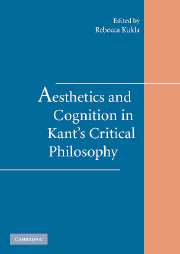Book contents
- Frontmatter
- Contents
- Notes on Contributors
- Acknowledgments
- 1 Introduction: Placing the Aesthetic in Kant's Critical Epistemology
- PART I SENSIBLE PARTICULARS AND DISCURSIVE JUDGMENT
- 2 Thinking the Particular as Contained under the Universal
- 3 The Necessity of Receptivity: Exploring a Unified Account of Kantian Sensibility and Understanding
- 4 Acquaintance and Cognition
- PART II THE COGNITIVE STRUCTURE OF AESTHETIC JUDGMENT
- PART III CREATIVITY, COMMUNITY, AND REFLECTIVE JUDGMENT
- Bibliography
- Index
2 - Thinking the Particular as Contained under the Universal
Published online by Cambridge University Press: 24 July 2009
- Frontmatter
- Contents
- Notes on Contributors
- Acknowledgments
- 1 Introduction: Placing the Aesthetic in Kant's Critical Epistemology
- PART I SENSIBLE PARTICULARS AND DISCURSIVE JUDGMENT
- 2 Thinking the Particular as Contained under the Universal
- 3 The Necessity of Receptivity: Exploring a Unified Account of Kantian Sensibility and Understanding
- 4 Acquaintance and Cognition
- PART II THE COGNITIVE STRUCTURE OF AESTHETIC JUDGMENT
- PART III CREATIVITY, COMMUNITY, AND REFLECTIVE JUDGMENT
- Bibliography
- Index
Summary
In a well-known passage from the Introduction to Kant's Critique of the Power of Judgment, Kant defines the power or faculty of judgment (Urteilskraft) as “the capacity to think the particular as contained under the universal” (Introduction IV, 5:179). He goes on to distinguish two ways in which this faculty can be exercised, namely, as determining or as reflecting. These two ways are defined as follows: “If the universal (the rule, the principle, the law) is given, then judgment, which subsumes the particular under it … is determining. But if merely the particular is given, for which the universal is to be found, then judgment is merely reflecting” (ibid.) As Kant goes on to make clear, the Critique of the Power of Judgment is particularly concerned with judgment in its capacity as reflecting rather than determining. It is concerned, that is, with how we are to find universals (which he glosses as rules, principles, or laws) for given particulars.
Despite the fact that the term ‘concept’ does not appear in this set of definitions, Kant's discussions of judgment elsewhere make it clear that this faculty can be identified at least in part with our capacity to think particular objects under concepts, in particular empirical concepts. The sense of ‘universal’ (allgemein), then, would appear to be the same sense that is implied in Kant's characterization of a concept as a “universal” (or as it is sometimes translated, a “general”) representation (Logic §1, 9:91).
- Type
- Chapter
- Information
- Aesthetics and Cognition in Kant's Critical Philosophy , pp. 35 - 60Publisher: Cambridge University PressPrint publication year: 2006
- 12
- Cited by



